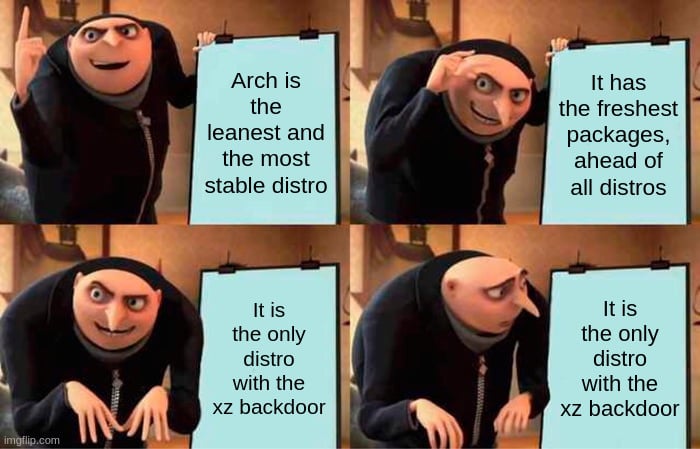this post was submitted on 30 Mar 2024
286 points (84.7% liked)
linuxmemes
21060 readers
263 users here now
Hint: :q!
Sister communities:
- LemmyMemes: Memes
- LemmyShitpost: Anything and everything goes.
- RISA: Star Trek memes and shitposts
Community rules (click to expand)
1. Follow the site-wide rules
- Instance-wide TOS: https://legal.lemmy.world/tos/
- Lemmy code of conduct: https://join-lemmy.org/docs/code_of_conduct.html
2. Be civil
- Understand the difference between a joke and an insult.
- Do not harrass or attack members of the community for any reason.
- Leave remarks of "peasantry" to the PCMR community. If you dislike an OS/service/application, attack the thing you dislike, not the individuals who use it. Some people may not have a choice.
- Bigotry will not be tolerated.
- These rules are somewhat loosened when the subject is a public figure. Still, do not attack their person or incite harrassment.
3. Post Linux-related content
- Including Unix and BSD.
- Non-Linux content is acceptable as long as it makes a reference to Linux. For example, the poorly made mockery of
sudoin Windows. - No porn. Even if you watch it on a Linux machine.
4. No recent reposts
- Everybody uses Arch btw, can't quit Vim, and wants to interject for a moment. You can stop now.
Please report posts and comments that break these rules!
founded 1 year ago
MODERATORS
you are viewing a single comment's thread
view the rest of the comments
view the rest of the comments

I think the confusion comes from the meaning of stable. In software there are two relevant meanings:
Unchanging, or changing the least possible amount.
Not crashing / requiring intervention to keep running.
Debian, for example, focuses on #1, with the assumption that #2 will follow. And it generally does, until you have to update and the changes are truly massive and the upgrade is brittle, or you have to run software with newer requirements and your hacks to get it working are brittle.
Arch, for example, instead focuses on the second definition, by attempting to ensure that every change, while frequent, is small, with a handful of notable exceptions.
Honestly, both strategies work well. I've had debian systems running for 15 years and Arch systems running for 12+ years (and that limitation is really only due to the system I run Arch on, rather than their update strategy.
It really depends on the user's needs and maintenance frequency.